
Top Seeds International at Fruit Logistica with two new brands
March 17, 2020
New tomato’s, peppers & cucumbers at Fruit Logistica 2019
March 17, 2020As Europe’s largest fresh-produce show, Fruit Logistica in Berlin is one of the main arometers for wider trends in the Continent’s fresh-produce sector. Last week’s (5-7 February) show saw several launches, including the event’s Innovation Award winner on the theme of vegetable varieties with extra nutrition. But in each case, this message has been framed within a package of attributes including taste, convenience and sustainability.
The purple colouring of Syngenta’s prize-winning cocktail tomato, Yoom, indicates high levels of anthocyanin and carotenoids, both antioxidants, while it is also unusually high in vitamin C,
magnesium and potassium. These combine with an “intense umami taste with the perfect sweet-sour balance, among its many other qualities”, according to the breeder.
Chief executive Erik Fyrwald says: “These tomatoes are exactly what consumers are looking for in the grocery store — they are tasty, healthy and convenient.”
A dedicated website, yoomtomato.com, is intended to strengthen brand awareness, while its bespoke cardboard packaging, produced from sustainably managed forests, reinforces the sustainability message. The company has already established the variety in several European markets and plans to extend this to the UK shortly.
Marketing concept
Two Japan-based breeders also launched high-nutrition produce ranges onto the European market.
Takii Europe unveiled Phytorich, a premium marketing concept stressing the high phytonutrient content of its vegetable range, which extends across onion, carrot, squash, collard, mizuna, okra, spinach, Chinese cabbage and sweet pepper.
Takii says Phytorich has become “a matured brand recognised and preferred on a consumer level” since its launch on the home market 25 years ago.
Under the slogan “Food with Purpose”, the Mitsui-owned Top Seeds International presented the Ikygai range with a live cooking demonstration. As with the other two, the effort here is being led by tomatoes, with the “fruity and sweet” orange Yuka described as rich in carotenoids, “which are good for skin”, while the more savoury brown Umami “is full of carotenoids and lycopene that are good for the heart”. Again, sustainable packaging is part of the brand image.
This fits in with predictions made in last year’s Sainsbury’s-commissioned The Future of Food
report that “there is great potential for bio-fortification foods to become much more common on our shelves”. Indeed the retailer already sells “Super Mushrooms” rich in vitamins D and B12.
Food Foundation executive director Anna Taylor tells Horticulture Week: “It’s good to see
businesses starting to focus on the nutrient content of fruit and veg, which has often played
second fiddle in crop-breeding priorities. But these efforts will only succeed if we work on making fruit and veg more accessible, affordable and appealing, especially while eating out or on the go, because currently we consume far too little to protect our health.”
Push and pull
Barbara Bray, a food safety and nutrition consultant who last year published a Nuffield report into the potential of market-driven approaches to boosting fresh produce consumption, says: “There is definitely ‘pull’ from consumers as well as ‘push’ from the breeders, and suppliers will react to that.”
But she adds: “A shopper will choose to eat a particular variety of tomato due to a combination of things, and here retailers need to get smarter. You need to be able to shout about how good it looks and tastes as well as its nutritional value. Without that, any new product will struggle.”
On this, Bray points to the high-nutrition Beneforté broccoli variety, launched a decade ago, which “didn’t take off because it looks and tastes the same as any other broccoli”.
Such moves are hampered by legislation covering the health claims that can be made of a product, she adds. “If you are simply saying that a food item is a source of, say, vitamin A, that can be shown. But a claim that it will reduce your blood pressure or cholesterol will get you into trouble unless you can show it brought about the change, and that takes a lot of resources.”
But she says the trend shows promise given the growing public interest in healthy, plant- based eating, as well as sustainability, adding: “People accept that we need to produce food of good nutritional quality and not waste it. But it has to be something they want to eat.”
Small packages
“Snacking” varieties of tomatoes, sweet peppers and carrots have already become a common sight in retailers and food outlets. But SN!BS, Dutch breeder Rijk Zwaan’s new brand specifically for its growing snack range, extends this to more unusual produce including radish, celery, melon, lettuce, kohlrabi and cauliflower.
“In mature markets such as Western Europe, SN!BS can stimulate retailers to broaden and deepen their category of healthy snacks,” says chain and retail manager Jan Doldersum. The company hopes retailers will embrace SN!BS as a consumer brand. It also presented packaging ideas at its Fruit Logistica launch to complement the varieties.
The breeder has also introduced the Little & Fresh range of smaller organic vegetables for loose sale, intended for smaller households keen to avoid waste. A pilot begun in July 2019 with Dutch supermarket chain Jumbo will lead to a wider roll-out in 2020.
Syngenta also presented a new mini seedless watermelon at Fruit Logistica, describing
it as “a new size concept for the modern family with minimal waste”.





